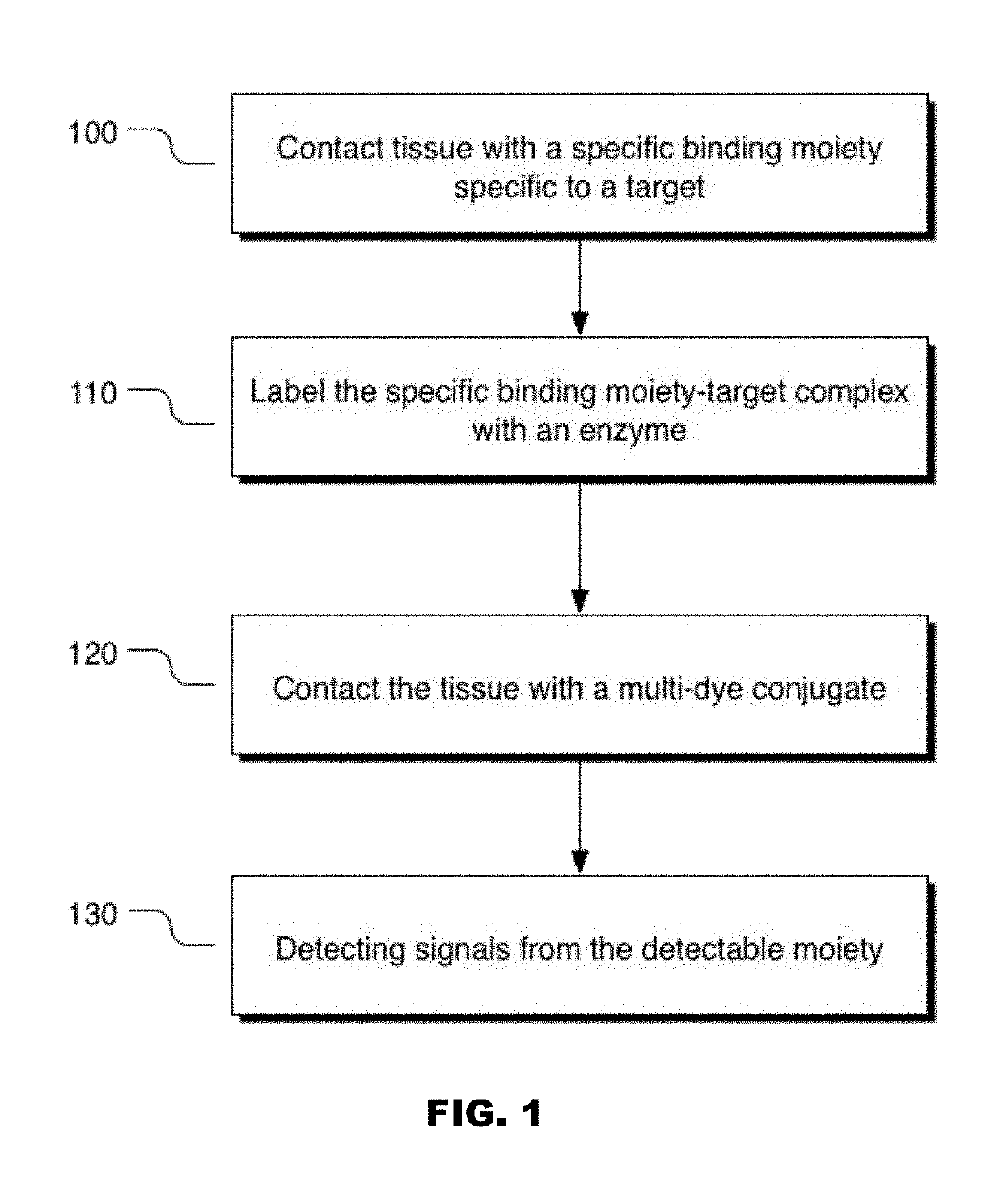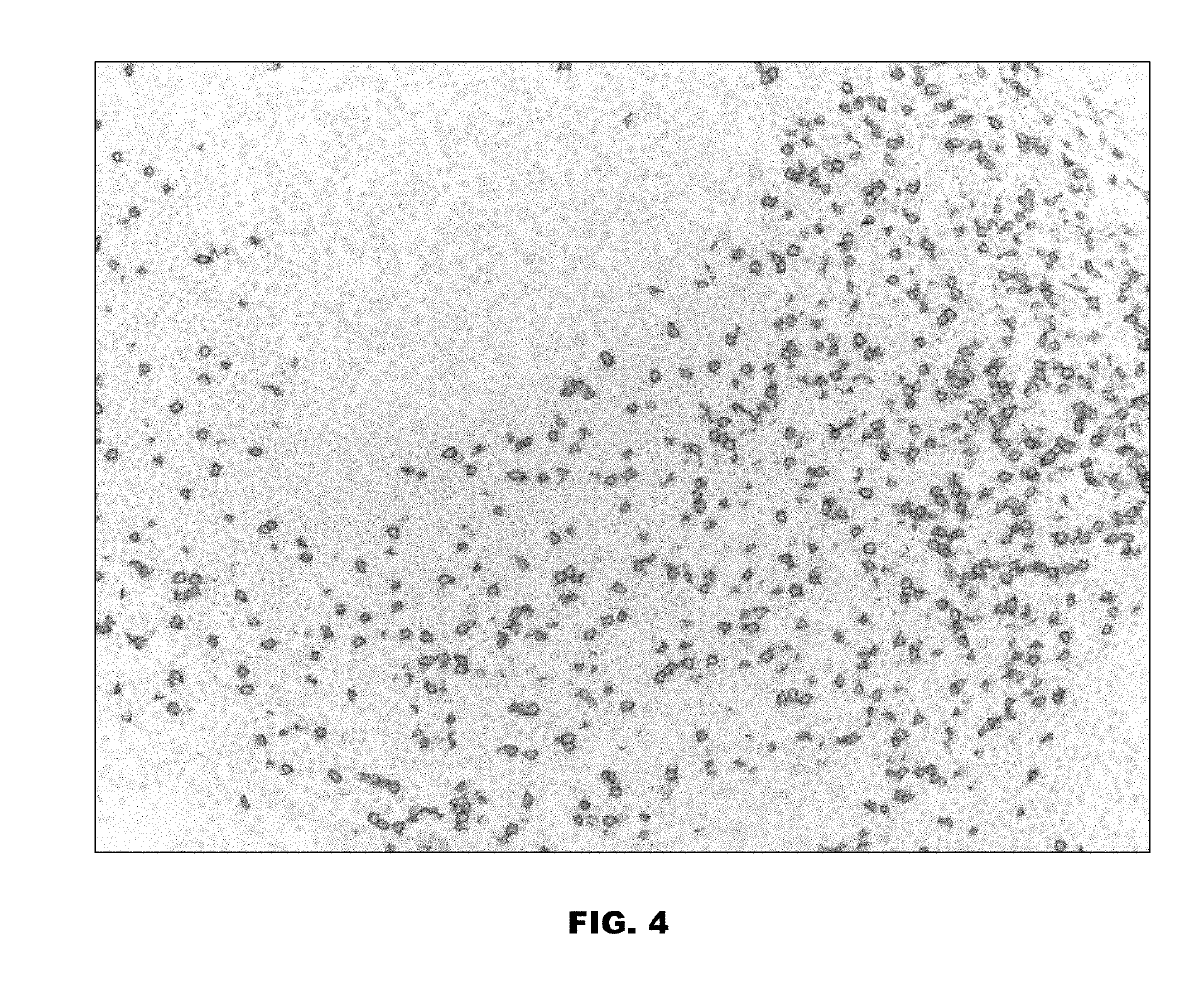Colors for chromogenic ihc and ish staining with multi-dye quinone methide and tyramide conjugates
- Summary
- Abstract
- Description
- Claims
- Application Information
AI Technical Summary
Benefits of technology
Problems solved by technology
Method used
Image
Examples
example 1 -
Example 1-Quinone Methide-TAMRA-Dabsyl Multi-Dye Conjugate
[0266]The Quinone Methide-TAMRA-Dabsyl Multi-Dye Conjugate comprises two chromophores, namely a TAMRA chromophore and a Dabsyl chromophore. While TAMRA alone produces a magenta color and Dabsyl alone produces a yellow color, the multi-dye conjugate produces a red color.
[0267]The Quinone Methide-TAMRA-Dabsyl Multi-Dye Conjugate was used in an assay to stain the CD8 marker in tonsil tissue. The tissue was first deparaffinized and antigen retrieved (Cell Conditioning 1, CC1, VMSI #950-124) for about 64 minutes. Then rabbit-anti-Ki-67 antibody was applied and incubated (37° C., about 16 minutes). Subsequent washes were followed by incubation with a secondary goat polyclonal anti-rabbit, alkaline phosphatase conjugate (37° C.; about 12 minutes). After incubation with the AP conjugate the slides were washed with saline sodium citrate buffer (SSC, VMSI #950-110). Co-incubation of 200 μL of a 0.5 M tris solution (pH 10.0) and 100 μL ...
example 2
TAMRA-Cy5 Multi-Dye Conjugate
[0272]The Tyramide-TAMRA-Cy5 Multi-Dye conjugate comprises two chromophores, namely a TAMRA chromophore and a Cy5 chromophore. While TAMRA alone produces a magenta color and Cy5 alone produces a cyan color, the multi-dye conjugate produces a violet color.
[0273]The Tyramide-TAMRA-Cy5 Multi-Dye Conjugate was used in an assay to stain the Ki67 marker in tonsil tissue. The tissue was first deparaffinized and antigen retrieved with CC1 for 64 minutes. Endogenous peroxidases were inactivated by incubation with a 1% H2O2 solution for 4 minutes. Rabbit-anti-Ki-67 antibody was applied and incubated (37° C., 16 minutes). Subsequent washes were followed by incubation with a secondary goat polyclonal anti-rabbit, horse radish peroxidase conjugate (37° C.; 8 minutes). After incubation with the HRP conjugate, 200 μL of an about 0.1 to about 1 mM solution of Tyramide-TAMRA-Cy5 Multi-Dye Conjugate and 100 μL 0.1% H2O2 solution were co-incubated for about 32 minutes. The...
example 3
TAMRA-FITC Multi-Dye Conjugate
[0277]The Tyramide-TAMRA-FITC Multi-Dye Conjugate comprises two chromophores, namely a TAMRA chromophore and a FITC chromophore. While TAMRA alone produces a magenta color and FITC alone produces a yellow color, the multi-dye conjugate produces a red color.
[0278]The Tyramide-TAMRA-FITC Multi-Dye Conjugate was used in an assay to stain the Ki67 marker in tonsil tissue as described in Example 2. A primary antibody specific to Ki67 was first introduced to the tonsil tissue sample to form an antibody-target complex. A secondary antibody was then introduced, namely an anti-Ki67 antibody conjugated to a horseradish peroxidase enzyme. Upon introduction of the Tyramide-TAMRA-FITC Multi-Dye Conjugate, the horseradish peroxidase converted the Tyramide-TAMRA-FITC Multi-Dye Conjugate to a reactive intermediate which was then able to bond to tissue, either proximal to or directly on the labeled Ki67 target. As illustrated in FIG. 6, the Tyramide-TAMRA-FITC Multi-Dye...
PUM
 Login to View More
Login to View More Abstract
Description
Claims
Application Information
 Login to View More
Login to View More - R&D
- Intellectual Property
- Life Sciences
- Materials
- Tech Scout
- Unparalleled Data Quality
- Higher Quality Content
- 60% Fewer Hallucinations
Browse by: Latest US Patents, China's latest patents, Technical Efficacy Thesaurus, Application Domain, Technology Topic, Popular Technical Reports.
© 2025 PatSnap. All rights reserved.Legal|Privacy policy|Modern Slavery Act Transparency Statement|Sitemap|About US| Contact US: help@patsnap.com



